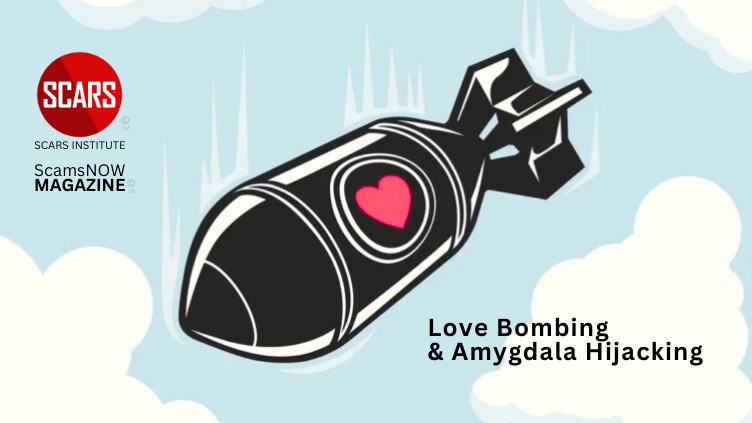Scam Victim Psychological Alienation After A Scam
Scam Victim Recovery Psychology
Authors:
• Vianey Gonzalez B.Sc(Psych) – Licensed Psychologist Specialty in Crime Victim Trauma Therapy, Neuropsychologist, Certified Deception Professional, Psychology Advisory Panel & Director of the Society of Citizens Against Relationship Scams Inc.
• Tim McGuinness, Ph.D. – Anthropologist, Scientist, Director of the Society of Citizens Against Relationship Scams Inc.
Article Abstract
Scam victims grappling with the aftermath of romance scams often experience profound and lasting psychological alienation, extending beyond financial loss. Psychological alienation involves feeling disconnected from oneself, others, and the world, leading to self-estrangement, social isolation, powerlessness, and normlessness.
Scammers employ sophisticated grooming, manipulation, and control tactics, causing victims to question their vulnerability and decision-making abilities, and rupturing trust in personal relationships. Coping with psychological alienation requires seeking professional support, engaging in therapy, and joining support groups.
Victims can rebuild trust and reconnect by acknowledging their experience does not define them, practicing self-compassion, and gradually extending trust to supportive relationships. Understanding the psychology behind scams empowers victims to reclaim control, fostering resilience against future threats. The journey towards recovery involves acknowledging, understanding, and addressing the emotional aftermath of the scam.
Scam Victim Psychological Alienation in the Aftermath of Romance Scams Can Be Devastating And Long Term Unless Addressed
The aftermath of romance scams (relationship scams or any scam that includes deep friendship or a strong trust relationship) extends beyond financial loss, delving into the intricate realms of psychological alienation. Scam victims find themselves ensnared in a web of emotional manipulation, leaving lasting imprints on their mental well-being. This can result in profound psychological impacts and alienation experienced by scam victims after the scam concludes in just one of them.
Psychological Alienation: Feeling Lost in Your Own World
Psychological alienation is a complex state of feeling disconnected from oneself, others, and the world around you. It’s not just feeling lonely or isolated, but a deeper sense of estrangement and lack of belonging. Imagine living in a world that feels foreign and meaningless, even in the midst of others.
There are several dimensions to psychological alienation:
- Self-estrangement: Feeling disconnected from your own thoughts, emotions, and desires. You might feel like you’re acting like a character in someone else’s play, or that your true self is hidden away.
- Social isolation: A perceived or actual lack of meaningful connections with others. You might feel misunderstood, judged, or simply unable to relate to those around you.
- Powerlessness: Feeling like you have little control over your life or the world around you. You might feel trapped by circumstances, manipulated by others, or simply unable to make a difference.
- Normlessness: Feeling like you don’t fit in with the prevailing norms and values of society. You might feel like an outsider, a rebel, or simply someone who doesn’t understand the rules of the game.
These different dimensions can combine and overlap, combining with other psychological impacts after the scam creating a deep sense of disorientation and distress.
The Basics – Causes of Psychological Alienation
Several factors can contribute to psychological alienation, including:
- Traumatic experiences: Abuse, neglect, or other traumatic experiences can damage our sense of self and others.
- Social and cultural factors: Living in a society with high levels of inequality, social isolation, or oppression can lead to feelings of alienation.
- Existential concerns: Grappling with the meaning of life, our place in the universe, and our own mortality can trigger feelings of alienation.
- Mental health conditions: Some mental health conditions, such as depression and anxiety, can also contribute to feelings of alienation.
Shadows of Manipulation
Romance scams are sophisticated operations that employ psychological manipulation to exploit victims emotionally and financially. As victims gradually realize the deceit, they grapple with feelings of betrayal, humiliation, and a pervasive sense of isolation. The scammer’s deceitful tactics often lead to a breakdown of trust in personal relationships.
Psychological alienation manifests as victims struggle to reconnect with their emotions and trust their judgment. The isolation is not only external but becomes an internal battle as victims question their own vulnerability and decision-making abilities. Friends and family may offer support, but the lingering effects of the scam create barriers, making it challenging for victims to share their experiences authentically.
Victims often experience a profound shift in their self-perception. The idealized version of the relationship, meticulously crafted by the scammer, shatters, leaving victims grappling with feelings of inadequacy and self-blame. The psychological impact goes beyond the financial loss, penetrating the core of one’s identity.
Coping with Psychological Alienation
Recovery from psychological alienation is a multifaceted journey. Victims need to confront the emotional aftermath, seeking professional support and counseling to navigate the complex terrain of trauma. Support groups and therapy become crucial lifelines, providing a safe space for victims to express their vulnerabilities without fear of judgment.
If you’re struggling with psychological alienation, there are steps you can take to feel more connected to yourself and the world around you:
- Seek support: Talk to a therapist or counselor who can help you understand and address the underlying causes of your alienation.
- Connect with others: Build meaningful relationships with supportive friends, family members, or community groups.
- Find purpose and meaning: Engage in activities that give your life a sense of purpose and direction.
- Practice self-compassion: Be kind to yourself and recognize that you’re not alone in experiencing these feelings.
Remember, psychological alienation is treatable. With the right support and effort, you can reconnect with yourself and rebuild your sense of belonging in the world.
Empowerment through Understanding
Understanding the psychology behind the scam empowers victims to reclaim control over their narrative. Recognizing the manipulative tactics employed helps victims break free from the shadows of alienation. Education about common scam strategies serves as a preventive measure, fostering resilience against potential future threats.
Rebuilding trust, one step at a time is how it begins. Rebuilding trust, both in oneself and in others, is a pivotal aspect of overcoming psychological alienation. Victims must acknowledge that their experience does not define them and embark on a journey of self-compassion and forgiveness. Reconnecting with supportive relationships and gradually extending trust helps in restoring a sense of normalcy.
Summary
Psychological alienation in the aftermath of romance scams is a silent struggle that demands acknowledgment and understanding. By unraveling the shadows cast by manipulation, victims can embark on a journey of recovery, healing, and empowerment. Through shared experiences and professional guidance, survivors can emerge from the shadows, resilient and ready to rebuild their lives.
Please Rate This Article
Please Leave Us Your Comment
Also, tell us of any topics we might have missed.
Leave a Reply
Thank you for your comment. You may receive an email to follow up. We never share your data with marketers.
-/ 30 /-
What do you think about this?
Please share your thoughts in a comment above!
More:
- Scam Victim Catastrophizing Making Recovery Difficult 2024 (scamsnow.com)
- Trust: Romance Scams Betrayal And Scam Victims – 2024 (scamsnow.com)
- Vulnerability and Breakdown in Scam Victims – The Camel’s Back Syndrome Metaphor – 2024 (scamsnow.com)
- Scam Victim Stress – The Psychological, Cerebral, and Physiological Effects – 2024 (scamsnow.com)
- Reclaiming Your Worth: A Scam Survivor’s Guide to Navigating Your Worthiness After a Scam – 2023 (scamsnow.com)
- Scam Victims And The Crossing Of The River Styx – An Interpretation Of The Recovery Process – 2023 (scamsnow.com)
- Anger & Self-Radicalization – Recovery Psychology 2023 (scamsnow.com)
-/ 30 /-
What do you think about this?
Please share your thoughts in a comment above!
SCARS LINKS: AgainstScams.org RomanceScamsNOW.com ContraEstafas.org ScammerPhotos.com Anyscam.com ScamsNOW.com
reporting.AgainstScams.org support.AgainstScams.org membership.AgainstScams.org donate.AgainstScams.org shop.AgainstScams.org
youtube.AgainstScams.org linkedin.AgainstScams.org facebook.AgainstScams.org
ARTICLE RATING
TABLE OF CONTENTS
- Scam Victim Recovery Psychology
- Article Abstract
- Scam Victim Psychological Alienation in the Aftermath of Romance Scams Can Be Devastating And Long Term Unless Addressed
- Psychological Alienation: Feeling Lost in Your Own World
- The Basics – Causes of Psychological Alienation
- Shadows of Manipulation
- Coping with Psychological Alienation
- Empowerment through Understanding
- Summary
- More:
- SCARS Institute™ ScamsNOW Magazine
Society of Citizens Against Relationship Scams Inc. [SCARS]
CATEGORIES
MOST POPULAR COMMENTED ARTICLES
POPULAR ARTICLES
U.S. & Canada Suicide Lifeline 988
![NavyLogo@4x-81[1]](https://scamsnow.com/wp-content/uploads/2025/04/NavyLogo@4x-811.png)
ARTICLE META
WHAT PEOPLE ARE TALKING ABOUT LATEST SITE COMMENTS
See Comments for this Article at the Bottom of the Page
on Aren’t We All The Same? Aren’t We All Just Meat-Robots? An essay on Humanity by Tim McGuinness, Ph.D. – 2025: “excelente!!! la claridad y la profundidad del análisis son realmente impresionantes. Me aportó mucho leerlo. totalmente de acuerdo entre la…” Jul 16, 11:17
on Savior Syndrome And The Negative Consequences To Them And Other Scam Victims – 2023: “We must heal ourselves before trying to help or heal others. It is easy to get caught up in the…” Jul 16, 11:13
on Anger & Self-Radicalization – Recovery Psychology 2023: “Anger can be useful but most often it is destructive on the individual, their family and friends. I like that…” Jul 16, 10:59
on Residual Fear In Scam Victims – 2024 [UPDATED 2025]: “Thank you for another fantastic SCARS article! I have felt some fear lately, that has caused me to feel tense…” Jul 16, 10:10
on Living in the Invisible Safety Bubble – 2025: “Enlightening, thought provoking, and another SCARS article that gives me pause. Recovery is a process and takes time. In a…” Jul 16, 07:46
on Living in the Invisible Safety Bubble – 2025: “We have too many kinds of scams in Japan. Recently, there are impersonation scam of “fake Cardinal account” gathering fraud…” Jul 16, 07:27
on Motte and Bailey – A Cognitive Pattern & Defense Mechanism that Inhibits Honest Acceptance – 2025: “Important information for reflection for any survivor : -to what extent the Motte & Bailey method is present / still…” Jul 16, 07:21
on Arts and Crafts Can Significantly Aid in Recovery for Scam Victims – 2025: “Right after the scam, I didn’t want to do anything. I felt defeated and ashamed—as if I had betrayed both…” Jul 16, 00:01
on The Fallacy of Fallacies & Living in the Real World – Error in Reasoning that Makes an Opinion Seem Valid – 2025: “I didn’t know about fallacies and cognitive biases until I enrolled in the Survivor’s School. When I learned about them,…” Jul 15, 23:40
on Motivational Denial – Recovery Psychology – 2023: “I agree with this article about some motivational material Looking at motivational material is not a totally bad thing but…” Jul 15, 12:25
on Living in the Invisible Safety Bubble – 2025: “I thought this was a brilliant article….lots to think about now.” Jul 15, 09:39
on Arts and Crafts Can Significantly Aid in Recovery for Scam Victims – 2025: “I did not realize that things I like doing very much—knitting or sudoku—were so helpful in my recovery process. The…” Jul 14, 11:28
on Projection And Scam Victims: “The moment I realized I had a financial loss due to a scam I realized that I felt shame, guilt,…” Jul 13, 19:12
on Japanese Legend of Tears – When There Are No Words – 2025: “After discovering the fraud, the pain was enormous. I shed oceans of tears, but I always tried to do it…” Jul 13, 10:50
on The SCARS Institute Scam Victim Recovery Timeline – 2025: “Wow. I umm experienced some of the later curves. I have been bouncing back and forth between asking myself why…” Jul 11, 00:01
on Transference And Emotional Danger After The Scam – 2024: “Thank you for the kind but firm reminder that the person in the stolen profile photo has their own life.…” Jul 9, 01:26
on ‘Mental Defeat’ – The Unique Condition Of Giving Up – 2024: “Thank you for another great article. I can see from this article that mental defeat would be debilitating to a…” Jul 9, 00:49
on Trust: Romance Scams Betrayal And Scam Victims – 2024: “This provided valuable insight that I can identify with” Jul 8, 16:44
on A Scam Victim in Extreme Distress – Stopping the Pain – 2024: “Your trust issues are very understandable. We are very sorry this happened to you. We suggest that you contact an…” Jul 8, 14:42
on A Scam Victim in Extreme Distress – Stopping the Pain – 2024: “My online counselors advised me to check myself in. I went to the hospital because I was suicidal. After I…” Jul 8, 13:44
Important Information for New Scam Victims
Please visit www.ScamVictimsSupport.org – a SCARS Website for New Scam Victims & Sextortion Victims
SCARS Institute now offers a free recovery program at www.SCARSeducation.org
Please visit www.ScamPsychology.org – to more fully understand the psychological concepts involved in scams and scam victim recovery
If you are looking for local trauma counselors, please visit counseling.AgainstScams.org
If you need to speak with someone now, you can dial 988 or find phone numbers for crisis hotlines all around the world here: www.opencounseling.com/suicide-hotlines
Statement About Victim Blaming
Some of our articles discuss various aspects of victims. This is both about better understanding victims (the science of victimology) and their behaviors and psychology. This helps us to educate victims/survivors about why these crimes happened and not to blame themselves, better develop recovery programs, and help victims avoid scams in the future. At times, this may sound like blaming the victim, but it does not blame scam victims; we are simply explaining the hows and whys of the experience victims have.
These articles, about the Psychology of Scams or Victim Psychology – meaning that all humans have psychological or cognitive characteristics in common that can either be exploited or work against us – help us all to understand the unique challenges victims face before, during, and after scams, fraud, or cybercrimes. These sometimes talk about some of the vulnerabilities the scammers exploit. Victims rarely have control of them or are even aware of them, until something like a scam happens, and then they can learn how their mind works and how to overcome these mechanisms.
Articles like these help victims and others understand these processes and how to help prevent them from being exploited again or to help them recover more easily by understanding their post-scam behaviors. Learn more about the Psychology of Scams at www.ScamPsychology.org
SCARS INSTITUTE RESOURCES:
If You Have Been Victimized By A Scam Or Cybercrime
♦ If you are a victim of scams, go to www.ScamVictimsSupport.org for real knowledge and help
♦ Enroll in SCARS Scam Survivor’s School now at www.SCARSeducation.org
♦ To report criminals, visit https://reporting.AgainstScams.org – we will NEVER give your data to money recovery companies like some do!
♦ Follow us and find our podcasts, webinars, and helpful videos on YouTube: https://www.youtube.com/@RomancescamsNowcom
♦ Learn about the Psychology of Scams at www.ScamPsychology.org
♦ Dig deeper into the reality of scams, fraud, and cybercrime at www.ScamsNOW.com and www.RomanceScamsNOW.com
♦ Scam Survivor’s Stories: www.ScamSurvivorStories.org
♦ For Scam Victim Advocates visit www.ScamVictimsAdvocates.org
♦ See more scammer photos on www.ScammerPhotos.com
You can also find the SCARS Institute on Facebook, Instagram, X, LinkedIn, and TruthSocial
Psychology Disclaimer:
All articles about psychology and the human brain on this website are for information & education only
The information provided in this and other SCARS articles are intended for educational and self-help purposes only and should not be construed as a substitute for professional therapy or counseling.
Note about Mindfulness: Mindfulness practices have the potential to create psychological distress for some individuals. Please consult a mental health professional or experienced meditation instructor for guidance should you encounter difficulties.
While any self-help techniques outlined herein may be beneficial for scam victims seeking to recover from their experience and move towards recovery, it is important to consult with a qualified mental health professional before initiating any course of action. Each individual’s experience and needs are unique, and what works for one person may not be suitable for another.
Additionally, any approach may not be appropriate for individuals with certain pre-existing mental health conditions or trauma histories. It is advisable to seek guidance from a licensed therapist or counselor who can provide personalized support, guidance, and treatment tailored to your specific needs.
If you are experiencing significant distress or emotional difficulties related to a scam or other traumatic event, please consult your doctor or mental health provider for appropriate care and support.
Also read our SCARS Institute Statement about Professional Care for Scam Victims – click here
If you are in crisis, feeling desperate, or in despair, please call 988 or your local crisis hotline.
More ScamsNOW.com Articles
A Question of Trust
At the SCARS Institute, we invite you to do your own research on the topics we speak about and publish. Our team investigates the subject being discussed, especially when it comes to understanding the scam victims-survivors’ experience. You can do Google searches, but in many cases, you will have to wade through scientific papers and studies. However, remember that biases and perspectives matter and influence the outcome. Regardless, we encourage you to explore these topics as thoroughly as you can for your own awareness.















![scars-institute[1]](https://scamsnow.com/wp-content/uploads/2025/04/scars-institute1.png)
![niprc1.png1_-150×1501-1[1]](https://scamsnow.com/wp-content/uploads/2025/04/niprc1.png1_-150x1501-11.webp)

I absolutely experienced self-estrangement, self isolation, powerlessness and normlessness in the first months after the scam. My sense of identity was shattered and I couldn’t bear being around others, anyone, who might add to the guilt and shame I felt. I was certain nobody understood the pain I felt.
Once I started to heal a bit, I began reconnecting with friends and started socializing somewhat (usually meeting for lunch or dinner). I’m nowhere near the “social butterfly” I once was. That person exists in the past. The new me is learning to be discerning and trusting of others, including of people I’ve know for many years.
From this article I can see that I am still in the shadows. That said I am past self estrangement to a degree. There are times that I continue to feel disconnected with myself which frightens me terribly. When this happens I feel lost and like no one can understand this terrible thing that has happened to me. But they can’t begin to understand because I feel I can’t share it, because I don’t trust others to understand. I tried to talk with a trusted friend once and it turned so bad I’m afraid to try again. When I do have these periods of self-estrangement I dress in my baggy clothes from when I was severely overweight, soft comfy clothing, and a robe and curl around myself until my husband returns from work. Then I cling to him. I have begun discussing this feeling with my therapist as well. Because of these periods of self-estrangement and the failed attempt to talk with a trusted person I am experiencing social isolation. Enrolling in debt resolution when I realized with the high credit card interest rates I would only continue to lose ground in paying off the debt I incurred in my crime adds to my feelings of powerlessness. I have always experienced normlessness – I have never fit into society. I was considered a geek in school and was always picked on. It has always been hard for me to make friends and it is difficult for me to actually juggle multiple friends. Growing up the subject of friends was they only want something from us and aren’t really friends was a constant lecture. I can see where a good deal of my trauma originated in my childhood.
Self-estrangement and a sense of powerlessness have been part of my post scam experience. I’m sure this will pass in time as my recovery continues. I’m looking forward to a brighter future ahead when all of this is just a faded memory.
This article is very useful to understanding the dangers of isolation after a romance scam. By reading this article, I learn why isolation hurts so much and how hard is to overcome it without the proper steps and guidance..